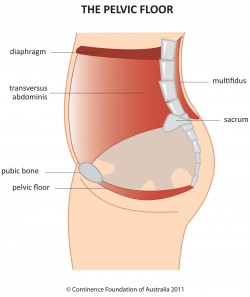Demystifying The Pelvic Floor
Understanding the muscles that control pee, poop and sex.
Image by Midwifery Traditions
The pelvic floor is a bowl-shaped group of muscles that span across the bottom of our pelvis. These muscles extend from the pubic bone to the tailbone, and from sit bone (ischial tuberosity) to sit bone (ischial tuberosity). In the above image, the pelvic floor is positioned as though someone is laying on their backs with their feet pointing towards you. While the image above is the pelvic floor of a female body, males have a pelvic floor too, I'm just not focusing on it today (sorry, guys).
These muscles control your bladder, bowel and sexual function.
Because of where the pelvic floor is, they wrap around the urethra, vagina, and anal opening. That's why when these muscles are tight or weak, we end up with bladder, bowel and sexual dysfunction. Problems with your pelvic floor can contribute to well-known issues like urinary incontinence, but these problems can also contribute to painful intercourse and low back pain, as well as a number of other conditions.
“We, as a society, do not have a good understanding of how the pelvic floor muscles work because we aren't supposed to talk about things happening "down there." In order to properly take care of our bodies, we need to be able to understand that vagina is not a foul word."
It's important to note that the pelvic floor muscles don't work alone! The pelvic floor teams up with your abdominal and low back muscles, as well as your diaphragm. Together, these muscles help control the way we move, breathe and function.
The muscles in our pelvic floor can also affect strength and mobility in our hips. That's right! If you've had chronic hip tightness and you've tried everything but you haven't looked at your pelvic floor... maybe you haven't tried everything!
The point is, these muscles have a huge role to play in our physical health and they shouldn't be ignored.
If you're wondering how your pelvic floor may be impacting your bladder, bowels or sexual function, give us a call or contact us!
For more information, follow us on instagram at ladybirdpt or on the Lady Bird Physical Therapy facebook page!


